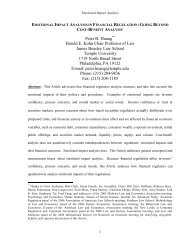Secure Implementation Experiments: Do Strategy-proof Mechanisms ...
Secure Implementation Experiments: Do Strategy-proof Mechanisms ...
Secure Implementation Experiments: Do Strategy-proof Mechanisms ...
You also want an ePaper? Increase the reach of your titles
YUMPU automatically turns print PDFs into web optimized ePapers that Google loves.
elatively better than a non-secure one). In a real world application, the subjects may become<br />
confused about the rules of the game and the payoffs. We leave for the future the task of<br />
studying how noise can be minimized in practical applications. But we believe that overly<br />
pessimistic conclusions about the future of mechanism design, which some researchers have<br />
drawn based on the poor performance of non-secure mechanisms in laboratory experiments,<br />
may not be justified at this point. Our experiment suggests that there is no inherent flaw in the<br />
game theoretic predictions that would rule out all possible practical applications. 20<br />
In practical applications, mechanisms should not be too complex, due to the finite<br />
information processing capacity of the players. It turns out that requiring secure<br />
implementation does not lead to more complex mechanisms: attention can be restricted to<br />
revelation mechanisms without loss of generality (Saijo, Sjöström and Yamato, 2003). By<br />
Proposition 1, the efficiency condition and strategy-<strong>proof</strong>ness essentially pin down the<br />
revelation mechanism in the public goods environment. In order to compare the performance of<br />
two efficient strategy-<strong>proof</strong> revelation mechanisms, one that is secure and one that is not, the<br />
environment (specifically, the set of valuation functions) has to vary across treatments (as in<br />
Treatment P versus Treatment S). In our experiment, we do not think this matters too much,<br />
because the presentation of the payoff tables was similar in the two treatments. Still, in other<br />
situations it may be possible to make interesting comparisons of the performance of secure<br />
versus non-secure mechanisms in the same environment. This is left for future experiments.<br />
Recently, Chen (2005) and Chen and Gazzale (2004) study whether mechanisms based<br />
on supermodularity conditions achieve convergence to Nash equilibria through learning. They<br />
find supermodular mechanisms converge significantly better than non-supermodular<br />
mechanisms in experiments. It would be interesting to investigate the role of supermodularity<br />
in accomplishing convergence to dominant strategy equilibria. It is easy to check that<br />
20 In contrast, if the secure mechanism had performed poorly in our experiment, this would have suggested that, no<br />
matter how well the mechanism could be explained to the participants, practical applications of mechanism design<br />
would have little hope of success.<br />
32
















